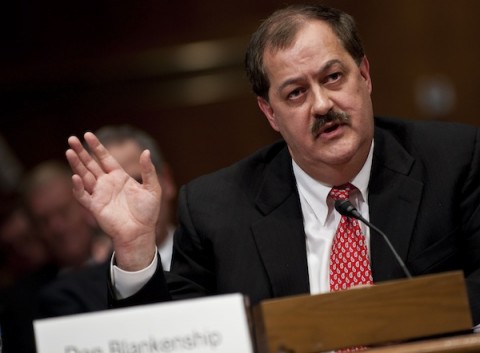Massey CEO Pushes Blame for Deadly Blast on Government
Mine Safety and Health Administration head Joseph Main countered, “MSHA did not run the Upper Big Branch Mine -- Massey Energy did.”
Jul 31, 202027.9K Shares872.2K Views
Massey Energy CEO Don Blankenship testifies before a Senate committee on Thursday. (Pete Marovich/ZUMApress.com)
Under fire for his company’s safety record following a deadly mining accident last month, Massey CEO Don Blankenship tried to shift the blame Thursday, telling Senate lawmakers that interference from federal regulators might very well have caused the disaster.
[Congress1] Not only did the Mine Safety and Health Administration force Massey to alter its ventilation system at the doomed Upper Big Branch Mine, Blankenship charged, but “just days” before the tragedy, MSHA had also certified that the mine was in “good condition,” he claimed.
“We complied with MSHA safety orders even when we strenuously disagreed with them and believed them to be detrimental to the health and safety of the mine,” Blankenship told lawmakers on the Senate Appropriations Subcommittee on Labor. “They forced us to ventilate backwards by not approving [our] plan.”
Though investigators have yet to determine the source of the blast, mine-safety experts suspect that it was caused by a buildup of methane combined with an accumulation of airborne coal dust — two conditions that mine ventilation systems are designed to alleviate.
To top it all off, Blankenship added, MSHA now wants a closed-door investigation, which he fears could allow the agency to clear itself of wrongdoing without the public knowing all the facts.
The message was clear, and it wasn’t lost on Sen. Robert Byrd. The 92-year-old West Virginia Democrat told Joseph Main, the head of MSHA, “This sounds like someone is trying to blame your agency for the death of 29 miners.”
Main was quick to push back, arguing that the ultimate responsibility for miners’ safety lies with the mine operator. “MSHA did not run the Upper Big Branch Mine — Massey Energy did,” he said. “I have no clue what the basis of [Blankenship's] argument is.”
The comments arrive as federal, state and independent investigators continue to probe the cause of the April 5 disaster. The tragedy, the most deadly mine accident in 40 years, has put the spotlight on Massey’s safety record, reputed to be the worst in the business.
Blankenship defended Massey’s safety record Thursday, maintaining that the number of citations it’s racked up is “probably about average” for the industry. If it’s higher, he added, that’s because mining in Central Appalachia involves “difficult underground conditions,” and because Massey produces more coal in the region than anyone else.
Yet MSHA data don’t support that argument. In 2009, for instance, the Upper Big Branch racked up 515 safety violations while producing roughly 1.2 million tons of coal. Meanwhile, the Robinson Run mine, a Consol-owned operation in West Virginia’s Marion County, produced 5.5 million tons of coal in the same year while receiving just 158 citations.
The discrepancy wasn’t lost on Cecil Roberts, president of the United Mine Workers of America, who accused Massey of nurturing a culture where production is prioritized over safety, and workers are scared to file complaints for fear of losing their jobs. “This isn’t the average,” Roberts said of Massey’s safety violations. “This is deplorable.”
“Mr. Blankenship,” Byrd added, “Massey is not average.”
Thursday’s hearing marked Blankenship’s first appearance before Congress since the April 5 blast. But you wouldn’t have known it by the turnout. Although two Capitol police officers roamed the room, no protestors surfaced. And aside from Byrd, only two other Democrats — Sens. Tom Harkin (Iowa) and Patty Murray (Wash.) — attended.
No Republicans showed up at all.

Paula M. Graham
Reviewer
Latest Articles
Popular Articles
